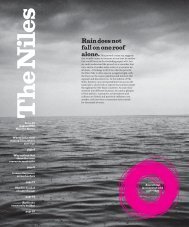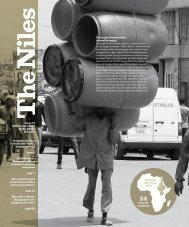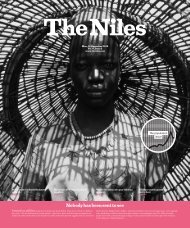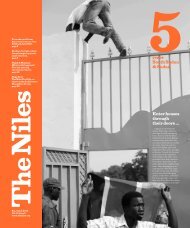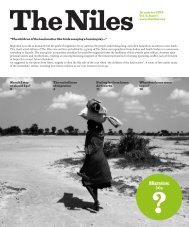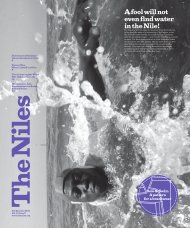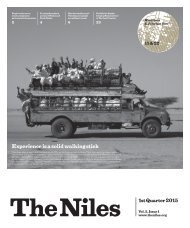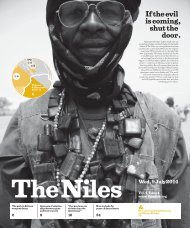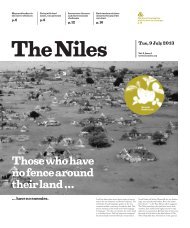When deeds speak, words are nothing
Speaking about sustainable development is easy. Acting sustainably is another matter. And now the evidence is unequivocal: Mankind’s impact on nature is causing the climate to change rapidly and drastically, threatening the environment and the very resources we need to survive. Aware that humanity is careening close to the edge, The Niles correspondents set out to explore where and how people in the Nile Basin region rethink. So much of their findings for now: We are an endlessly innovative species. Cooperation is our superpower. When deeds speak, words are nothing.
Speaking about sustainable development is easy. Acting sustainably is another matter. And now the evidence is unequivocal: Mankind’s impact on nature is causing the climate to change rapidly and drastically, threatening the environment and the very resources we need to survive. Aware that humanity is careening close to the edge, The Niles correspondents set out to explore where and how people in the Nile Basin region rethink. So much of their findings for now: We are an endlessly innovative species. Cooperation is our superpower. When deeds speak, words are nothing.
Create successful ePaper yourself
Turn your PDF publications into a flip-book with our unique Google optimized e-Paper software.
“It ceased to
be a hydropower
development
project.”
#Nile
#Ethiopia
#Egypt
#Sudan
#GrandEthiopianRenaissanceDam
of water – therefore the floods – increasing
the power supply – through electricity from
Ethiopia.
Recently, however, this has changed to
instilling fears and worries regarding Sudan’s
water security portraying Ethiopia as acting
selfishly regarding the “shared” water source.
News reports focused on the expected decrease
in sediment that will impact farmers along
the river, for example.
Telling people suffering from a severe
electricity crisis that they will be experiencing
more power blackouts can spark very intense
feelings. In fact, according to an official
Sudanese source, power generation from
Sudanese dams could increase if the GERD,
once fully operational, would be operated
cooperatively.
Another example of the media zooming in
on the potential negative impacts of the GERD
is announcing that 50 percent of the seasonal
farms on the banks of the river will be lost and
covered with water – which might be true – but
without clarifying that the remaining 50 percent
can be cultivated regularly instead of seasonally.
There would be fewer chances of flooding
disasters like before.
I asked one of the high-ranking Sudanese
officials regarding the second filling and why
there were more worries and fears this time.
“The negotiation was going better then, and
we didn’t want to impact it negatively,” he said.
“But lately, that tone has changed. It is ok to
magnify the fears.”
Currently, the narrative is being altered
again, with Egypt’s surprising statement that
the second filling will not cause significant
harm. Sudanese officials once again highlight
the benefits of the dam in their public briefings.
These alterations show how politicised
this issue is.
The need to alter our approach
The media narratives in the three countries
built up and stirred resentments among the
people towards their neighbours. The spread
of mis- and disinformation also created the
mistrust that is apparent when you talk to
people in these countries about the GERD,
maintained by some wild theories, all different
and mostly wrong.
Another observation is that most of this
coverage is rarely supported by scientific data
or information from reliable sources. It lacks
accurate figures and focuses on provoking
emotions. Sometimes journalists would even
interview some so-called “experts” who are wellknown
for their fanatic statements to get more
reads. Balanced and fact-driven stories often
“have no market”, some Sudanese editors say.
For accuracy, some of the issues reported
in the media and the worries they raise are
well-grounded and should be discussed. But
the way concerns are covered in the news so
far creates more problems, making it harder
to find amicable solutions.
While concerns were raised regarding the
impact of the GERD on the water security of
Sudan and Egypt, a study highlighted a cooperative
method to operate the dam by additionally
utilising solar and wind power to generate
electricity along with hydropower to mitigate
the dam’s impact on the downstream countries.
But apart from some science-focused publishers,
the study wasn’t picked up by significant
media outlets in the three countries.
If the idea is feasible or not is best determined
by scientists. But to keep the public
GERD discourses solution-oriented, the study
would have provided an excellent hook for
news editors across the basin. And this is just
one example of many leads that could have
been reported on instead of recycling negative
news again and again.
Towards productive reporting
All matters regarding the GERD are political
now. Soon after the establishment of the dam
was announced, it ceased to be a hydropower
development project and became a national
security issue. We have seen that media played
a significant role in supporting this transition
and even influencing the political negotiations
regarding the dam.
Positive progress, such as the signing of the
Declaration of Principles in 2015 and its outcomes,
did not generate the same attention as
the fears and worries. The media helped turn
the GERD from a development structure that can
be discussed technically, legally and from a perspective
of unity and cooperation to a political
mess approached with nationalism and adversity.
Media outlets need to increase their reach
is understandable, but that can also be achieved
by creating conversations around solutions
rather than problems. Instead of recycling
reports regarding the absence of an agreement,
we can produce scientific supported reports
that show cooperation scenarios and their
benefits, for example.
Using credible information, reliable sources
and fact-based data also requires journalists’
consideration of all the technical and legal
aspects of the issue. Some regional and international
institutions realised this need and
held events bringing journalists from different
countries together and even linking them with
experts. This reflected positively on the media
coverage and the journalists’ understanding
of the different narratives and the importance
of science in covering water-related news.
Still, more change is needed. We need
more balanced, well-sourced, responsible, and
objective reporting aiming towards cooperation
and togetherness in the region, coverage that
creates constructive conversations rather than
exacerbating conflicts and reflects the problematic
aspects in a solution-oriented way, not as
inflammatory statements.
We need to rethink how we report transboundary
issues of mutual interest and regional
importance, such as the GERD. Focusing
on cooperative approaches that seek mutual
benefit, unity, and togetherness creates a
win-win situation. It is high time we stop
fuelling geopolitical tension and boosting
public fear.
47









